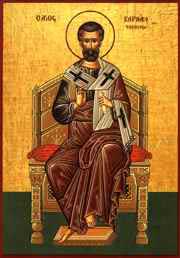St Barnabas Day
| Saint Barnabas | |
|---|---|

Icon of Saint Barnabas
|
|
| Prophet, Disciple, Apostle to Antioch and Cyprus, Missionary, and Martyr | |
| Born | unknown Cyprus |
| Died | reputedly 61 AD Salamis, Cyprus |
| Venerated in | Roman Catholic Church, Eastern Orthodox Churches, Oriental Orthodox Churches, Anglican Communion, Lutheran Church |
| Canonized | Pre-Congregation |
| Major shrine | Monastery of St Barnabas in Famagusta, Cyprus |
| Feast | June 11 |
| Attributes | Pilgrim's staff; olive branch; holding the Gospel of Matthew |
| Patronage | Cyprus, Antioch, against hailstorms, invoked as peacemaker |
Barnabas (English: b|ɑr|n|ə|b|ə|s; Greek: Βαρνάβας), born Joseph, was an early Christian, one of the prominent Christian disciples in Jerusalem. According to Acts 4:36, Barnabas was a Cypriot Jew. Named an apostle in Acts 14:14, he and Paul the Apostle undertook missionary journeys together and defended Gentile converts against the Judaizers. They traveled together making more converts (c 45–47), and participated in the Council of Jerusalem (c 50) Barnabas and Paul successfully evangelized among the "God-fearing" Gentiles who attended synagogues in various Hellenized cities of Anatolia.
Barnabas' story appears in the Acts of the Apostles, and Paul mentions him in some of his epistles. Tertullian named him as the author of the Epistle to the Hebrews, but this and other attributions are conjecture. Clement of Alexandria and some scholars have ascribed the Epistle of Barnabas to him, but his authorship is disputed.
Although the date, place, and circumstances of his death are historically unverifiable, Christian tradition holds that Barnabas was martyred at Salamis, Cyprus, in 61 AD. He is traditionally identified as the founder of the Cypriot Orthodox Church. The feast day of Barnabas is celebrated on June 11.
...
Wikipedia
